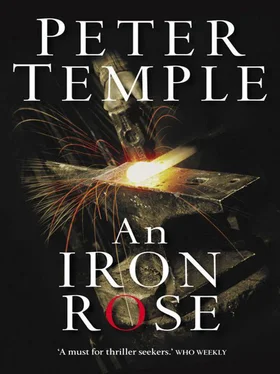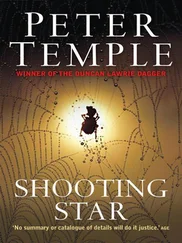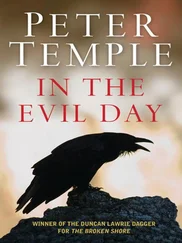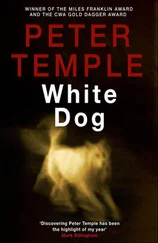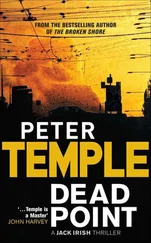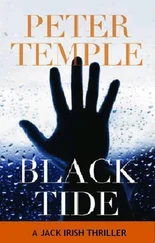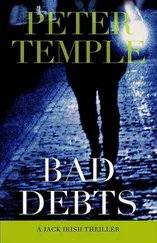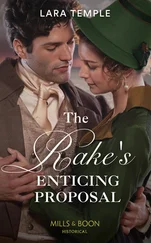Peter Temple - An Iron Rose
Здесь есть возможность читать онлайн «Peter Temple - An Iron Rose» весь текст электронной книги совершенно бесплатно (целиком полную версию без сокращений). В некоторых случаях можно слушать аудио, скачать через торрент в формате fb2 и присутствует краткое содержание. Жанр: Триллер, на английском языке. Описание произведения, (предисловие) а так же отзывы посетителей доступны на портале библиотеки ЛибКат.
- Название:An Iron Rose
- Автор:
- Жанр:
- Год:неизвестен
- ISBN:нет данных
- Рейтинг книги:3 / 5. Голосов: 1
-
Избранное:Добавить в избранное
- Отзывы:
-
Ваша оценка:
- 60
- 1
- 2
- 3
- 4
- 5
An Iron Rose: краткое содержание, описание и аннотация
Предлагаем к чтению аннотацию, описание, краткое содержание или предисловие (зависит от того, что написал сам автор книги «An Iron Rose»). Если вы не нашли необходимую информацию о книге — напишите в комментариях, мы постараемся отыскать её.
An Iron Rose — читать онлайн бесплатно полную книгу (весь текст) целиком
Ниже представлен текст книги, разбитый по страницам. Система сохранения места последней прочитанной страницы, позволяет с удобством читать онлайн бесплатно книгу «An Iron Rose», без необходимости каждый раз заново искать на чём Вы остановились. Поставьте закладку, и сможете в любой момент перейти на страницу, на которой закончили чтение.
Интервал:
Закладка:
I unrolled the big enlargement. ‘Here’s the house. Here’s the creek. Here’s the old mill. Now, from the length of the house shadow in the old photograph…’
‘You can pinpoint the sundial,’ Anne Karsh said, pointing. She had strong hands, no rings. ‘God, it’s just jungle.’
‘We’ve found it,’ I said. ‘Box and yew trees now. Something else puzzled us.’ I pointed to a large area, bare in comparison with the rest of the garden, to the right of the house.
‘Not a natural shape,’ Anne Karsh said. She bent over the photograph and her hair swung like a silk curtain and touched my cheek. I flicked a glance at her. I wished I’d shaved.
‘Not at all natural, Anne,’ Francis said. ‘Very perceptive of you.’
‘No-one had mentioned,’ I said, that the original house burned to the ground in 1904.’
‘The shape of a house,’ Leon Karsh said. ‘You fellows have done well.’
‘Thank you, Leon,’ Francis said, modestly.
‘The mark of the house still shows because, for some reason, they didn’t finally demolish the ruins until the late 1940s,’ I said. ‘They built the new house as a replica of the old one, but it was too late to change the main axis of the garden. You’ll also have to live with it.’
‘A pleasure,’ Anne Karsh said. I didn’t look at her. I wanted to.
‘Stan’s worked out the focal point of the main axis,’ I said. ‘The main sightline leads the eye to the church steeple in Brixton. You can’t see it now because of those pines planted about forty years ago. Stan found out that while Graham was working on the garden, he also designed the church. Colonel Peverell paid for it.’
‘One cheque satisfied both man and God,’ Leon Karsh said. ‘In that order. Things don’t change much.’
‘So,’ Francis said, ‘you can now appreciate the enorm… the magnitude of my task here.’
‘Can we see what’s happened so far?’ Leon Karsh said to me. I looked at Francis. He was not a pleased person.
‘Go ahead, Mac,’ he said. ‘I have planning to do.’ He turned to Anne Karsh. ‘My dear, you have no idea-the logistics of a project like this resemble fighting the Gulf War.’
The Karshes put on gumboots and I showed them what we’d found so far, including paths, a sunken tennis court and a pond that was gravity-fed through a stone aqueduct from a spring on the hillside behind the house.
‘Where does the water go from here?’ Anne Karsh said.
‘Haven’t got to that yet,’ I said. ‘Probably channelled down to join the creek above the pond that feeds the millrace.’
‘There’s a millrace?’ She checked herself, delighted. ‘Well, since there’s a mill, I suppose there is.’
‘In good shape,’ I said. ‘Locals say the mill produced flour until World War II. The creek’s dammed down there to create a millpond. You open a sluicegate to let water into the headrace.’
‘I’d like to see that,’ Anne Karsh said.
‘Next time,’ Leon Karsh said. ‘The architect should be here. Should have been here before us.’ He turned his weary eyes on me. ‘So you’re a landscape gardener?’
‘No.’
Leon looked at me. Not a glance. A look. In his eyes you could see instinct and intelligence. I was being evaluated. God knows what he saw in my eyes. Attraction to his wife perhaps.
‘No,’ I said, ‘I’m a blacksmith. I work for Stan when things are slow. Which is quite often.’
‘But you haven’t always been a blacksmith.’
‘Leon,’ Anne said, ‘you’re prying.’
‘That’s right,’ Leon said. ‘I’m prying. My whole life is spent prying.’
‘I’ve done a few things.’
‘And you’re not easily pried. We’ll need an estate manager here when we’re finished. You might be interested.’
‘Bit too independent these days,’ I said. ‘But that might change. I’ll show you what’s left of the walled garden on the way back.’
The architect was waiting at the house, a thin middle-aged man, wispy chicken-feather beard, dressed for an Atlantic crossing in an open boat. With him was a clone, cloned smaller, presumably the assistant architect. In my days among the rich, I’d observed that nothing they paid for came in ones: not lawyers, not gardeners, not architects, not whores. Even their women came with a mother or a sister or a friend, usually fat, often ugly, always resentful.
I excused myself to rejoin the labourers, to go back to my place. Leon shook my hand. Anne said, ‘I’d like to see the mill some time if that can be arranged.’
‘Any time you want to see it, it’s down there,’ I said. ‘It’s your mill.’
‘Mac,’ Leon said, ‘I’ll tell Francis to build in the time for showing Anne the mill. Keep her away from the dangerous places. These old buildings, everything’s rotten.’
‘Any time,’ I said.
I found Flannery and Lew on their hands and knees looking for a path. ‘Glad to see you’re safe,’ Flannery said. ‘Thought you’d slipped over onto the managerial side. Notice that woman’s mouth? Very powerful. Suck the grips off your handlebars. She give you an indication of anything?’
‘Said she found the bloke with the pie gravy running down his chin irresistible. Turned her on.’
‘I’ve heard it can do that,’ Flannery said. ‘Chittick’s pie.’
At the end of the day, we had a few beers at the Heart of Oak and then I went home, dog-tired, still hurting from Saturday’s football, sick at heart about Ned.
It was Lew’s turn to make the meal. I poured a big glass of red wine and went out to the office to finish making out Allie’s invoices. There was a note from her on the desk:
You are my № 1 football hero. Can I wash your jumper, anything that has been close to you? On second thoughts, perhaps not anything. To business. You’ll see I’m booked up tomorrow but can give you a hand with the, um, gateposts on Wednesday. See you tomorrow evening. Your devoted fan, Allie.
Something was nagging at me as I worked. November 1985. Ned and Dr Barbie. The depressed Dr Barbie. Barbie the skier.
Skiing.
I stopped writing mid-invoice and looked up Irene Barbie’s number. She answered on the second ring.
‘Irene, Mac Faraday. Sorry to bother you at night.’
‘That’s all right. I’ve been thinking about our conversation.’
‘I want to ask you about Ian and skiing.’
‘Yes.’ Puzzled.
‘When did he give it up?’
‘When? Oh, I’ll have to think-um, it would have been around 1986 or ’87.’
‘You said he went to Europe or Canada every year. What time of the year?’
‘Usually from mid-November. He’d get back in time for the start of the school holidays.’
‘You wouldn’t be able to say whether he went in November 1985, would you?’
‘I’m sure he did. I can find my diary if you want to hold on.’
‘Take as long as you like.’
I drank some wine and waited, feeling the tension in my neck and shoulders.
Irene Barbie was back within three minutes.
‘Mac? Still there?’
‘Yes.’
‘One second while I…’
I held my breath.
‘Left for Canada on November 13, came back December 5.’
I breathed out. ‘You’re sure that’s 1985?’
‘Oh yes. This is from my diary. Can you tell me why you want to know this?’
‘I’d like to talk to you again,’ I said. ‘If that’s possible. And I’ll tell you then.’
‘Ring me,’ she said.
I set off to get another glass of red. The pain had left my body. I felt a sense of relief and elation.
Marcia Carrier was lying about Ned and Ian Barbie.
Berglin traced Melanie Loreen Pavitt to an address in Shepparton, out where the neat town begins to fray. You drive past the restumped houses, disciplined yards, steam-cleaned driveways, tools hung on pegboard in swept garages, retired men in caps, full of empty purpose. Then the brick veneers, low, brown, ugly, lawns shaved, big windows blinded. At the end of the concrete drive, fixed to the two-car garage, a hoop. It waits for the sad boy to come home and throw the meaningless ball, pass the time until summoned to eat the processed food, watch the manufactured world, sleep.
Читать дальшеИнтервал:
Закладка:
Похожие книги на «An Iron Rose»
Представляем Вашему вниманию похожие книги на «An Iron Rose» списком для выбора. Мы отобрали схожую по названию и смыслу литературу в надежде предоставить читателям больше вариантов отыскать новые, интересные, ещё непрочитанные произведения.
Обсуждение, отзывы о книге «An Iron Rose» и просто собственные мнения читателей. Оставьте ваши комментарии, напишите, что Вы думаете о произведении, его смысле или главных героях. Укажите что конкретно понравилось, а что нет, и почему Вы так считаете.
